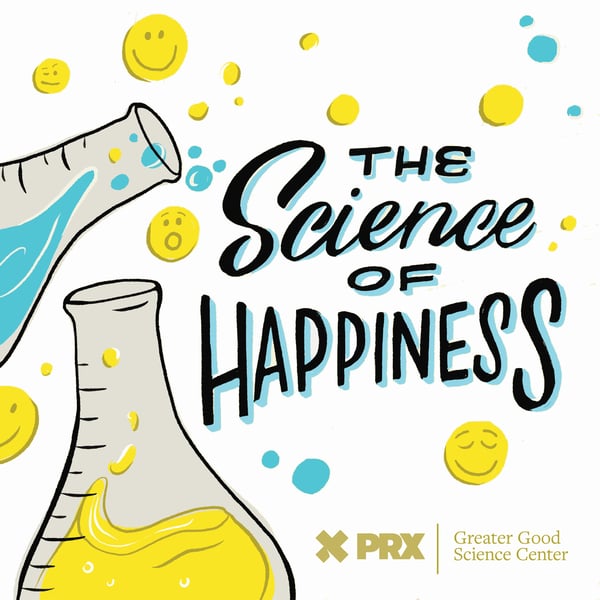Happiness Break: The Healing Power of Your Own Touch, with Kristin Neff
The Science of Happiness
PRX and Greater Good Science Center
4.4 • 1.9K Ratings
🗓️ 19 September 2024
⏱️ 10 minutes
🧾️ Download transcript
Summary
Dr. Kristin Neff guides us in a self-compassionate touch exercise, and shares the many research-backed reasons to cultivate kindness towards oneself.
Transcript: https://tinyurl.com/5xt3mz3h
Summary: Dr. Kristin Neff guides us through various practices of self-compassionate touch, such as placing hands over the heart or cradling the face, to provide comfort and support. Research shows that self-compassion can improve mental and physical well-being and activates the parasympathetic nervous system, reducing stress.
Guest: Dr. Kristin Neff is an associate professor in the University of Texas at Austin's department of educational psychology. She's also the co-author of 'Mindful Self-Compassion for Burnout,' which offers tools to help individuals heal and recharge from burnout.
How To Do This Self-Compassionate Touch Practice:
Take a moment to try these different touches and see which feels most supportive to you. Whenever you feel stressed or upset, or just need some extra support, use this compassionate touch to remind yourself that you’re here for you. Research shows the practice works best when practiced regularly.
Duration: 20 seconds, practiced daily or as often as you can.
Find a comfortable space. Sit or stand somewhere you feel relaxed and at ease. Try out these practices while thinking kind words to yourself, as though you were comforting a dear friend in distress.
1. Touch Your Heart: Place both hands gently over the center of your chest, one on top of the other. Apply just enough pressure to feel connected, but not uncomfortable. Focus on the warmth of your touch.
2. Feel Your Strength: If it feels right, make a gentle fist with your left hand, symbolizing strength, and place it over your heart. Rest your right hand on top of the fist to combine the feeling of strength and love.
3. Cradle Your Face: Gently cup each of your cheeks with your hands, holding your face as you would a loved one in distress. Let the touch be soft and caring.
4. Support Your Core: Place both hands over your solar plexus, just below your ribcage, and imagine you're holding and supporting your core. This can be particularly comforting if you're feeling fear or deep emotions.
5. Give Yourself a Hug: Cross your arms, resting each hand on the opposite shoulder. Gently squeeze yourself, adjusting the pressure to feel comforting but not overwhelming.
Related Science of Happiness episodes:
- How to Feel Better About Yourself
- Give Yourself A Break
- If You Want to Be More Productive, Cut Yourself Some Slack
Related Happiness Break mediations:
Transcript
Click on a timestamp to play from that location
| 0:00.0 | Welcome to happiness break, where we pause for a moment to try a practice shown to help |
| 0:07.8 | us live healthier, more fulfilling lives. |
| 0:11.0 | I'm Shuka Kalantari, and this week we're turning to a practice designed to help |
| 0:14.8 | foster self-compassion. Our God today is a familiar voice on the show, Dr. |
| 0:20.0 | Kristen Neff. You might remember her from previous episodes where she discussed the many benefits |
| 0:25.8 | of self-compassion. We're delighted to have her back to lead us through a meditation on self-compassionate |
| 0:31.8 | touch where we gently embrace ourselves as we would a loved |
| 0:35.9 | one in distress. If you missed last week's episode of the Science of Happiness, be |
| 0:40.9 | sure to listen after this meditation. We get into the signs of self-compassionate |
| 0:45.1 | touch and offer practical tips to make it part of your daily routine. Kristen's |
| 0:50.9 | new book, Mindful Self-Compassion for Burnout, offers tools to help heal and recharge |
| 0:55.8 | when you're overwhelmed by stress, like the self-compassionate touch practice she's sharing today. |
| 1:01.6 | When you're ready, here's Kristen. |
| 1:04.0 | I'm Dr. Kristin. |
| 1:05.0 | I'm Dr. Kristin Neff, and I research self-compassion, which refers to being helpful and supportive to ourselves when |
| 1:16.6 | we're struggling in some way, whether that's some stressor in our life or we |
| 1:21.8 | failed or made some mistake. |
| 1:24.0 | What the research shows is that when we show up for ourselves |
| 1:28.0 | in a warm kind supportive understanding way, |
| 1:32.0 | as opposed to being harsh or cruel or judgmental, of a |
| 1:34.1 | understanding way as opposed to being harsh or cruel or judgmental, |
| 1:35.5 | that we do better. We have better mental health, |
... |
Please login to see the full transcript.
Disclaimer: The podcast and artwork embedded on this page are from PRX and Greater Good Science Center, and are the property of its owner and not affiliated with or endorsed by Tapesearch.
Generated transcripts are the property of PRX and Greater Good Science Center and are distributed freely under the Fair Use doctrine. Transcripts generated by Tapesearch are not guaranteed to be accurate.
Copyright © Tapesearch 2025.

